IOS-G.M. Momin Women’s College two-day International Conference on “Need of Inter-religious Understanding for Promoting Peace and Harmony”
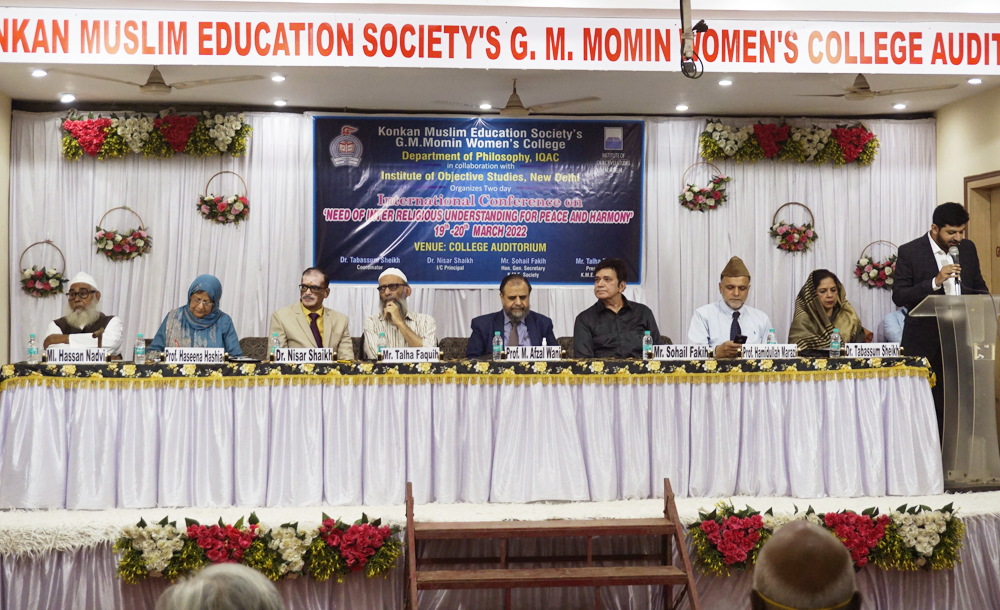
IOS-G.M. Momin Women’s College two-day International Conference on “Need of Inter-religious Understanding for Promoting Peace and Harmony”
A two-day offline/online International Conference on “Need of Inter-religious Understanding for Promoting Peace and Harmony” was organised by the Institute of Objective Studies in collaboration with KME Society’s G.M. Momin Women’s College, at Bhiwandi, Maharashtra, on March 19-20, 2022.
Inaugural session
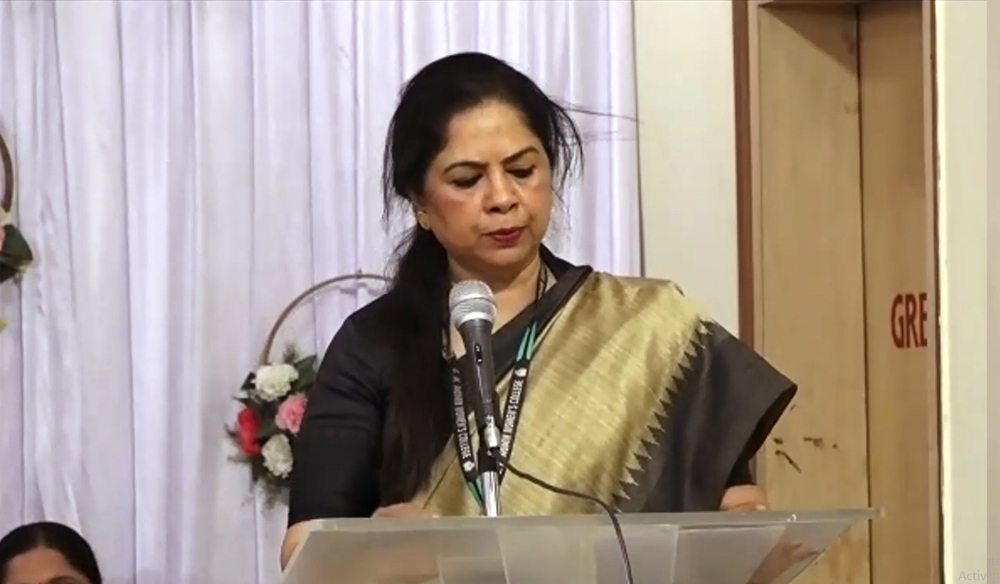
The conference got off to a great start with the recitation of a Quranic verse with its English translation. Dr. Tabassum Sheikh, coordinator of the conference, presented the welcome address. She said that religions taught virtues that could serve as the basis for an understanding of all religions. Tracing the history of the college, she observed that the Konkan Muslim Educational Society, which ran the college, was established in 1927. She hoped that the conference would bring both the institutions together for close cooperation in experience-sharing in the field of research. She said that the college was founded in 1989, and the eminent sociologist and scholar, Prof. A.R. Momin studied there. She also briefly spoke about the activities of the IOS.
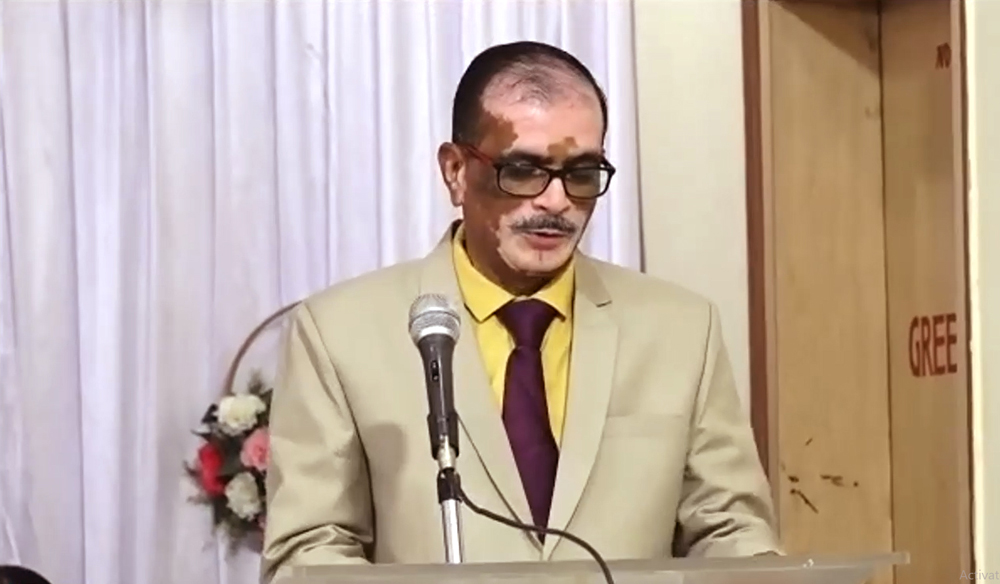
Dr. Nisar Shaikh, Principal, G.M. Momin Women’s College, Maharashtra, observed that the purpose of holding the conference was to bring students and research scholars together. It was also an opportunity to share new ideas that might help to solve several problems that cropped up off and on, he said.
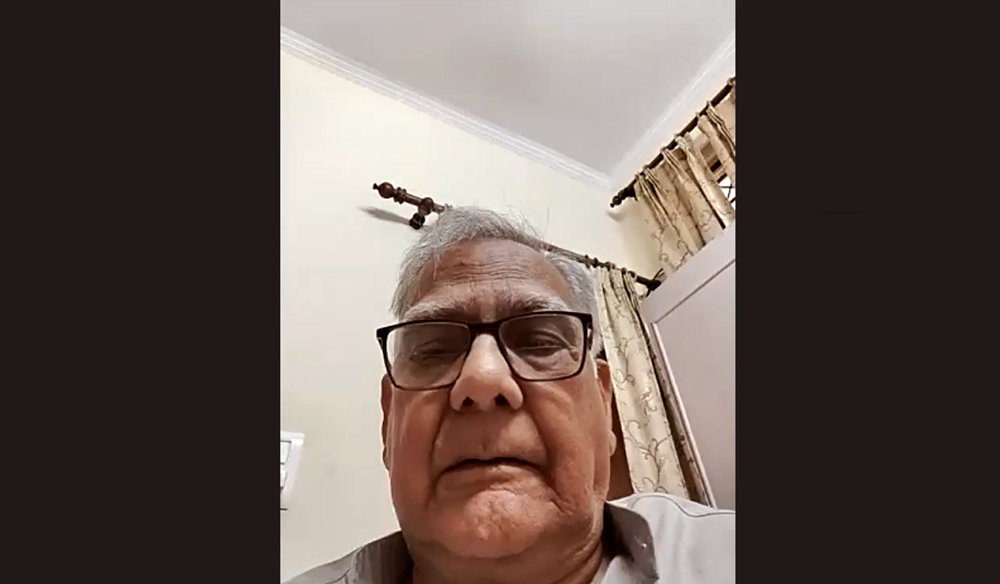
Secretary General, IOS, Prof. Z.M. Khan, highlighted the activities of the Institute and said that there were two highest decision-making bodies. These were the governing council (G.C.) and the general assembly (GA). The Institute invited research scholars to submit proposals for approval as projects on various themes. Referring to publications of the institute, he maintained that more than 400 books on a variety of subjects had so far been published. Besides, there were several regular publications. The Institute was engaged in holding local, national, and international seminars, symposia, and conferences on topical issues. Textbooks and reading books were published, and authors associated with them were requested to write them. A new series of books had been started to acquaint the younger generation with the basic tenets of Islam in Indian regional languages in a very simple way. The Institute had also instituted two awards, viz., the IOS Shah Waliullah Award and the IOS Lifetime Achievement Award. These awards were given every year to persons with exceptional contributions to scholarship and public service. He added that the IOS also built up a rich databank to cater to its needs and make the facility available to the institutions and those who wanted to use it. Commenting on the theme, he said it was very relevant in today’s context.
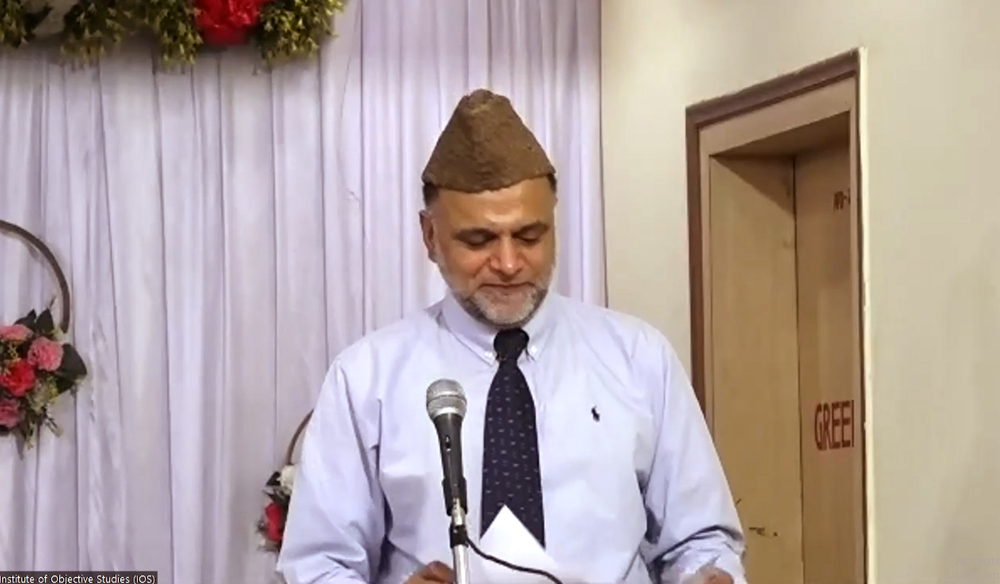
Introducing the topic, the convenor of the IOS Forum for Inter-religious Understanding, Prof. Hamidullah Marazi, pointed out that peace on the earth was not possible if there was no peace among religions. If peace was absent, progress would be stalled. Due to misunderstandings among the followers of different religions, there was blood letting on the earth in the name of religion. He said that Islam was a great advocator of peace, but the presentation of Islam from a negative perspective by the West created the spectre of Islamophobia. He opined that religion could play a big role in the restoration of peace and harmony in the world, adding that the activation of actual religion was the need of the hour. In order to ensure peace among religions, inter-religious dialogues meant inter-religion faith dialogues. He called for establishing peace and harmony and inter-religious understanding. He expressed happiness that a big response to the conference had been received from within and outside the country. He firmly believed that no dialogue meant deadlock.
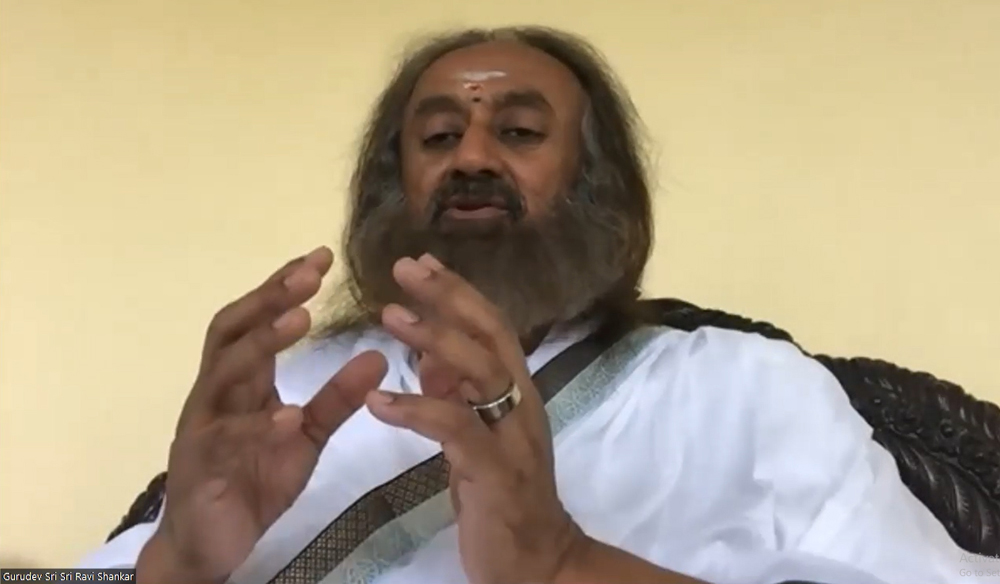
In his inaugural speech, spiritual leader and founder of the Art of Living, Bengaluru, Gurudev Sri Sri Ravi Shankar said that love, happiness and peace constituted the essence of all religions.
He felt delighted to be with the organisers and those in attendance at the conference. He held that certain forces were trying to divide countries and families, but efforts should be made to bring peace and happiness to everyone’s life. The most important thing in life is happiness, and it can be achieved by way of love. Nature loved diversity, and one had to live in diversity. This required happiness and peace in hearts, which would come only through love. There was an element of goodness in everybody’s heart, and this should be used to connect one individual with the other. He said that there was no deficit of love among people, and this could begin with giving respect to others. He called for leading a stress-free life. Only religion could create love, and the message of love, brotherhood, and ahimsa should reach every nook and corner of the country, he added.
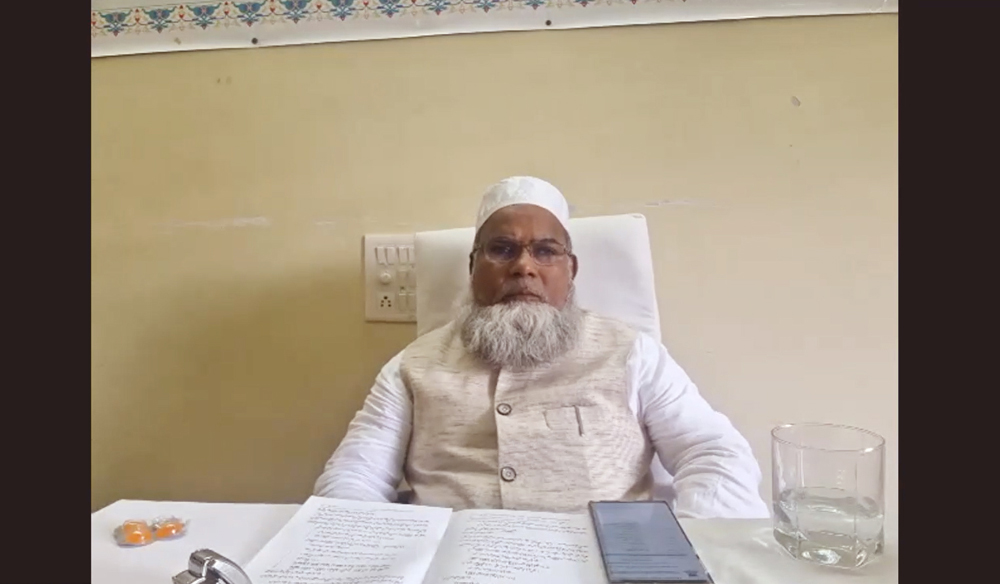
Delivering his keynote address, Maulana Khalid Saifullah Rahmani, General Secretary, All India Muslim Personal Law Board, New Delhi, observed that the Prophet (PBUH) gave the message of love and equality to people. In view of the prevailing situation in the country and the world, such conferences had become imperative. He urged the participants in the conference to spread the message of brotherhood and love all over the world. Referring to the Prophet’s (PBUH) last sermon at the Friday congregational prayer, He said, “All of you are the offspring of Allah and born to the same mother and father. O, faithful! Be fearful of your Master, who created you from a living being. “God is one, and since He is creator of every human being, everyone is equal”, he said. This created a sense of equality among human beings. The Prophet (PBUH) also said that all the human beings were the offspring of Allah. Hence, there was no distinction between them. There would have been distinction had one treated himself as superior to the other. Islam conceptualised the idea of equality among human beings for the first time in history. Prior to the advent of Islam, no such idea existed. The Prophet (PBUH) declared that no Arabian would have precedence over non-Arabian, and no white-skinned individual had preference over the black-skinned. Similarly, no one was preferable on the basis of his race, colour, religion, geographical area, or boundary. He (PBUH) invested every day with honour and grace. Commenting on religious differences, he said that the Prophet (PBUH) went from house to house to teach the Message of Allah by way of Dawah. If Allah had wanted only one religion to exist on earth, he would have done it. But the divergence of opinion among religions or within religion was a logical corollary due to the way of thinking. Earlier, a country had the followers of a single religion, and only they were allowed to live there. But Islam taught Muslims to engage with the followers of other religions by helping and giving due respect to them. He observed that the Prophet (PBUH) would not defend on the Day of Judgment who usurped property and looted non-Muslims.
It was an Islamic duty under Shariah to treat others as brothers and extend warmth and love to them. He called for dousing the fire of hatred and sharing others’ concerns. Every neighbour should be treated as a brother. He suggested that inter-religious dialogues should be organized in small towns, and representatives from all religions should be invited to attend.
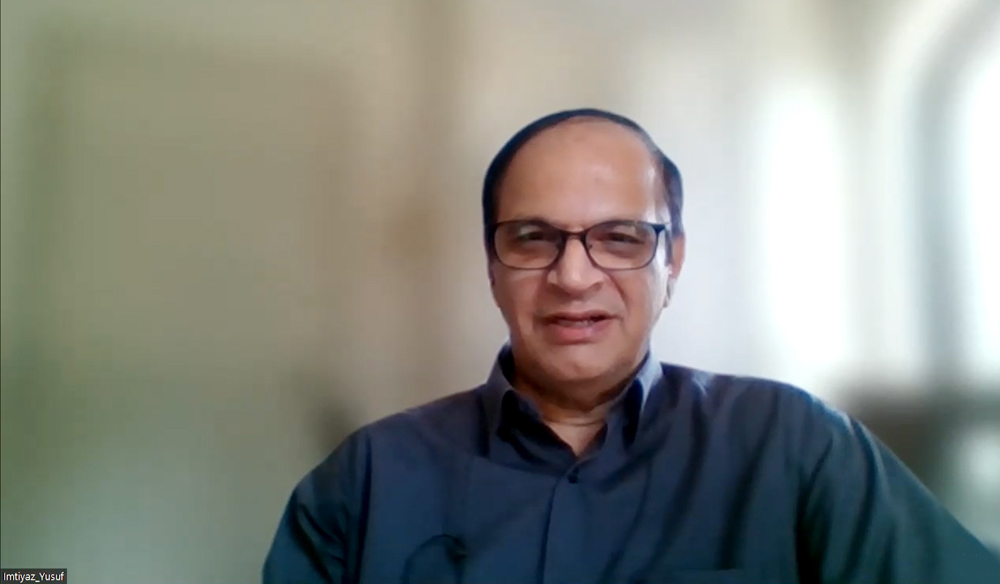
Speaking as the guest of honour, Prof. Imtiyaz Yusuf, Associate Professor, ISTAC, Malaysia, who shared his presentation through power-points, said that inter-religious understanding takes place when a crisis happens. Crisis in the modern age deepened, necessitating inter-faith dialogues to lessen it. He observed that currently, in Asia, there is an urgent need to build inter-religious understanding. The inter-faith dialogue was a far cry today. Referring to Muslims and the Indic religions, he said that the period between the eleventh and twelfth centuries marked the presence of Muslim pioneers in history and phenomenology of religion.
He made special mention of emperor Akbar in the 16th century and Dara Shikoh in the 17th century, who promoted religious understanding. Western discovery of Buddhism also influenced a number of countries to adopt the Buddhist religion and philosophy. Prophet Mohammad (PBUH), by the message of Tawhid, told the world to treat every individual irrespective of his religion, race, and colour, as equal. Commenting on the crisis and inter-religious dialogue in the modern age, he referred to several Muslim pioneers of inter-religious dialogue, including Asghar Ali Engineer. He clarified that dialogue was not a debate to enter into. He concluded by saying that interfaith dialogue should be a permanent feature, and the political will of every group was needed.
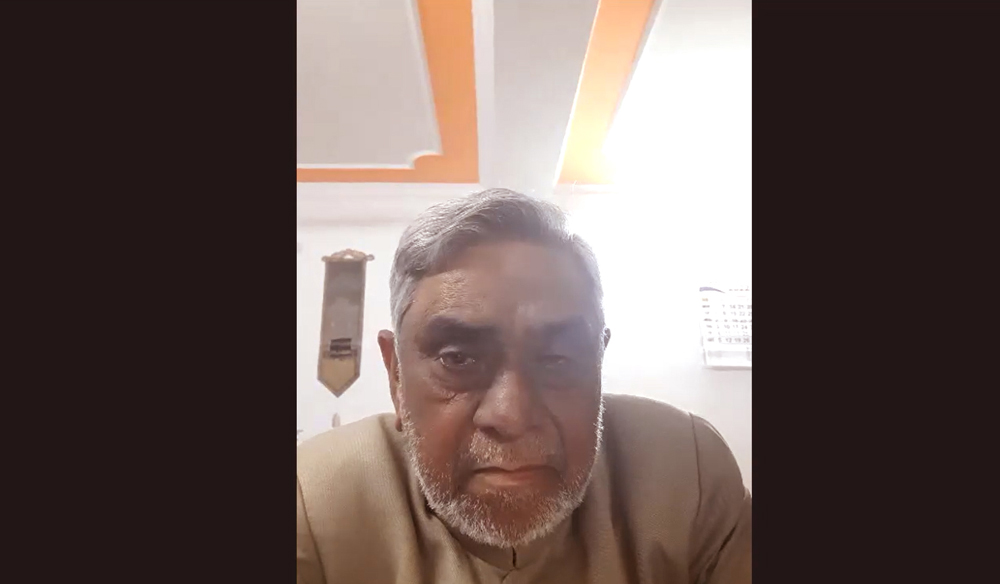
Former president of Maulana Azad University, Jodhpur, Prof. Akhtarul Wasey, held that every enlightened person was aware of the issue. Holding that inter-faith dialogue was the need of the hour, he said that tolerance should be seen from an acceptance perspective, not from the pressure perspective. The message of religious harmony should reach the people in a manner that is conducive to the inherent ethos of different religions. It should be convincing without being offensive and critical of others religions. The Prophet (PBUH) Himself politely and convincingly reached the message of Allah to the people who were idolators and cherished no values that a civilized world demanded. This message was possible only when one understood the sensibility of other religions in the same manner as he did in the case of his religion. He remarked how Muslims could expect Hindus to be secular without themselves being secular. They should follow their religion and honour every religion. Instead of disconnecting, religion always established a connection among people and strengthens bonds of love and harmony. He also urged Hindus to give equal respect to other religions by treating them on par.
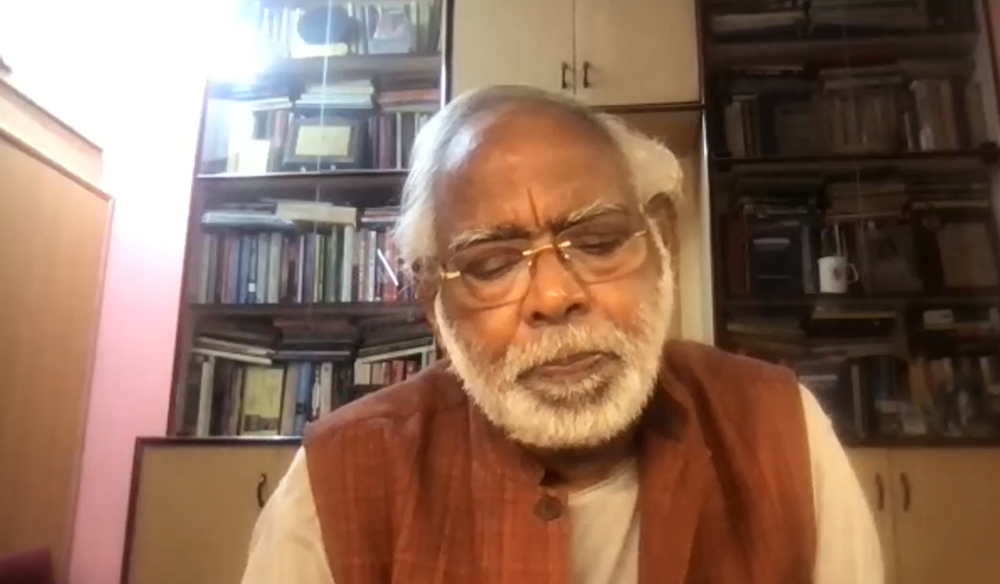
Mr. John Dayal, Member, National Integration Council and a veteran journalist, noted that all the communities shared their festivities together. It might be Holi, Eid, and other festivals. No religion wanted the blood to be splattered hither and thither. Referring to Islamophobia, he said that a deliberate attempt had been made to tarnish the image of Islam. Religious intolerance has strained warm relations among the followers of different religions. Politics and economy too played a contributory role in it. Emphasizing the need for inter-religious dialogues, he said that he had been trying for it for decades. The corporate world also played a role in the religious divide in the country, which could be tamed by making inter-faith dialogue a continuous process. He regretted that the National Integration Council created during the Congress rule became as good a non-functional because it had not been re-constituted by the current regime. He said that about 120 MPs belonging to SC/ST were politically empowered, but they could not speak on the atrocities committed on Adivasis, Christians, and Muslims. Even during the Crusade, when Christians and Muslims fought against each other for land, dialogues continued between them. One should take note of the world that changed in the last 110 years after the world religious congress was held in Chicago. He pleaded for discussing the issues relating to the minorities outside parliament because bodies, like Supreme Court, the human rights commission, minorities commission, miserably failed to solve their problems. He urged the IOS to create books on inter-religious faith dialogues and distribute them among students of all faiths.
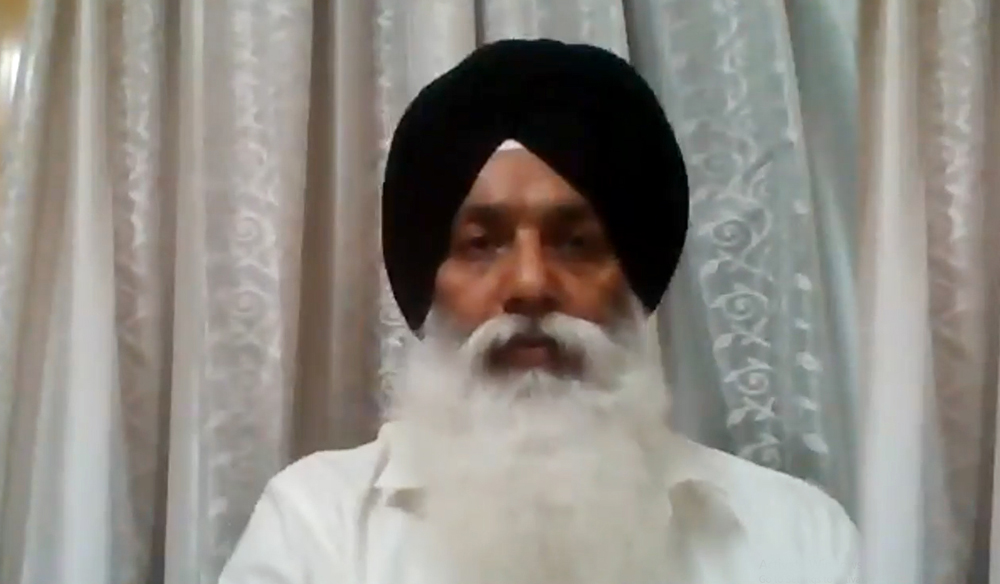
Prof. Paramvir Singh, Department of Sikhism, Punjabi University, Patiala, laid stress on the need for creating a universal brotherhood. He said that the teachings of Guru Nanak were still relevant to the entire mankind. He observed that the founder of the Sikh faith, Guru Nanak Dev, taught that there was one Lord whose light shined in every human being. Explaining the universality of the teachings of Guru Granth Sahib, he said that the great Sufi saint Baba Farid also contributed to the couplets of the Granth. All the Sikh gurus wanted freedom of faith and worship. They also wanted the followers of all religions to follow their faith. Again referring to the Guru Granth Sahib, he insisted that it emphasized harmony among all faiths.
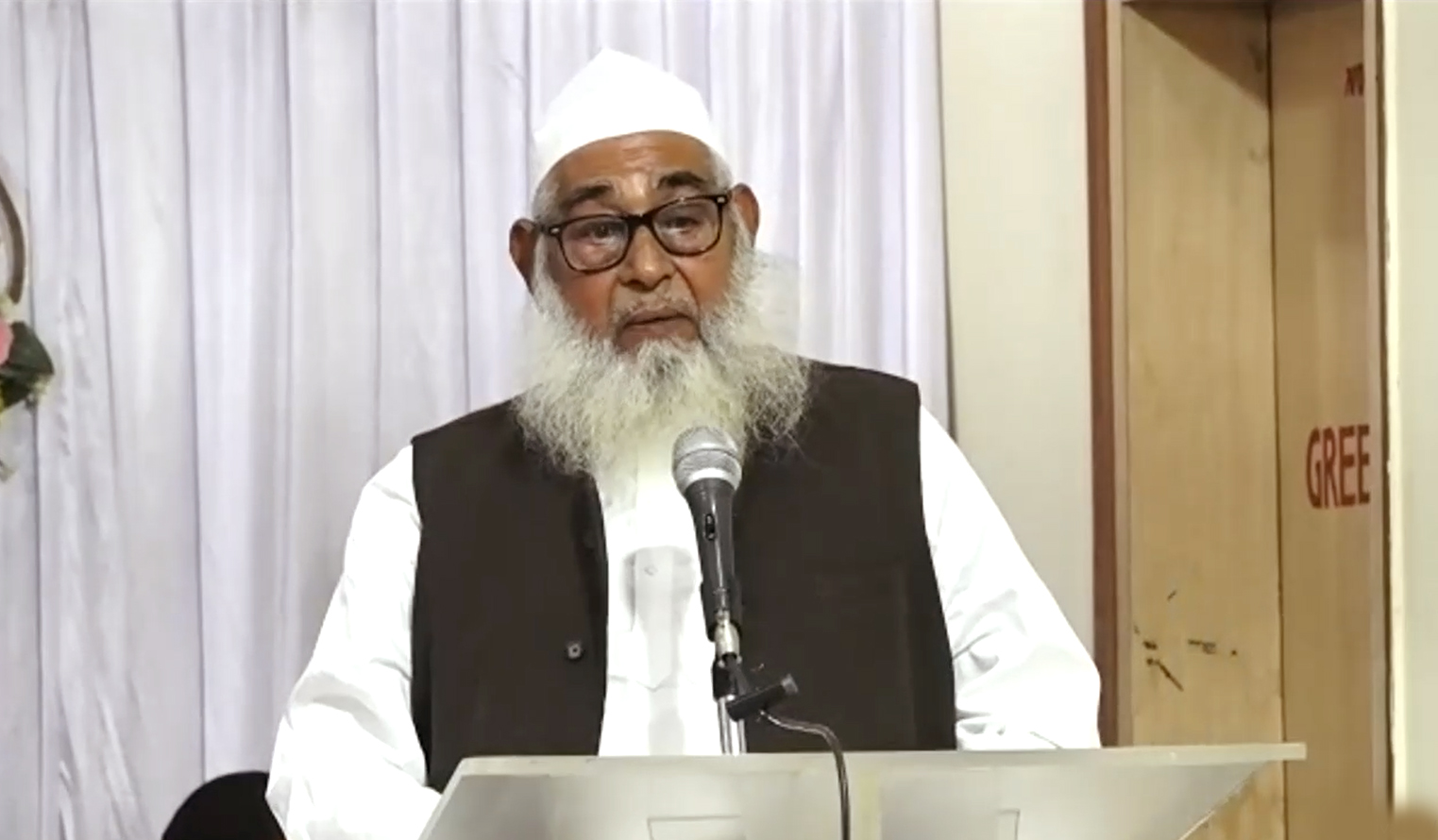
Maulana Hassan Nadvi, University of Cairo, Egypt, described the conference as very important. He held that inter-religious dialogues helped improve mutual relations among the followers of different religions. They also helped create an atmosphere in which the apprehension of confrontation between two religions stood little chance, and the respect for other religions increased. He counseled that everyone was obliged to protect whatever he possessed. This would change the entire perspective, he added.
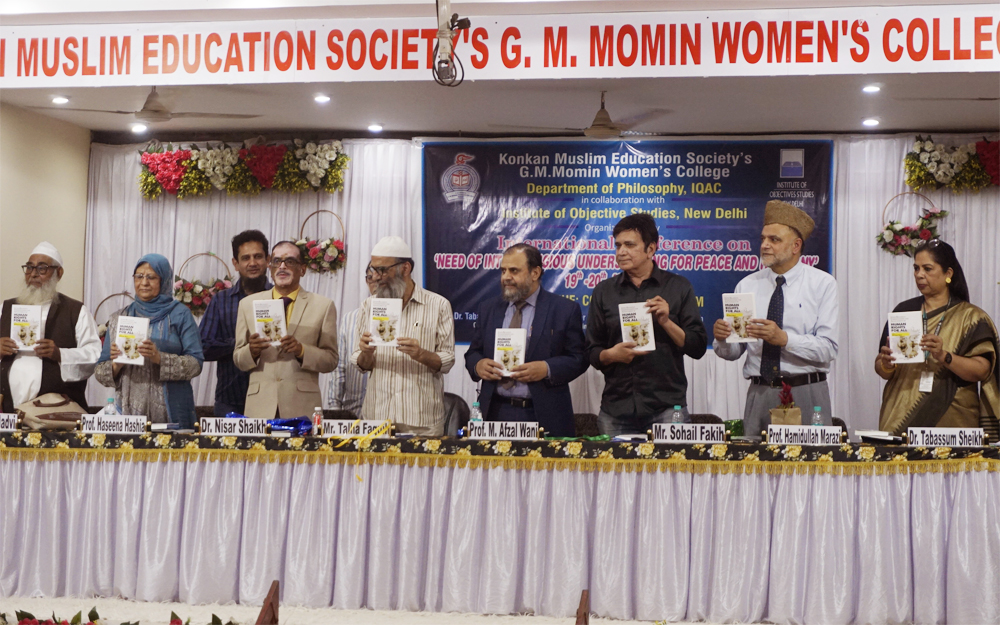
The occasion was marked by the release of three books published by the IOS. The first book, “Principal Foundations for Global Peace (A Way Forward for Better Future),” edited by Prof. M. Afzal Wani, was released by the president of KME Society, Mr. Talha Faquih. The second book, “Inter-religious Understanding for Advancement of Human Rights (for All)” also edited by Prof. Wani, was released by Dr. Nisar Ahmad Sheikh. The third book, “Islam Meri Nazar Mein”, written by Rishi Acharya, was released by the secretary general of KME Society, Sohail Fakieh.
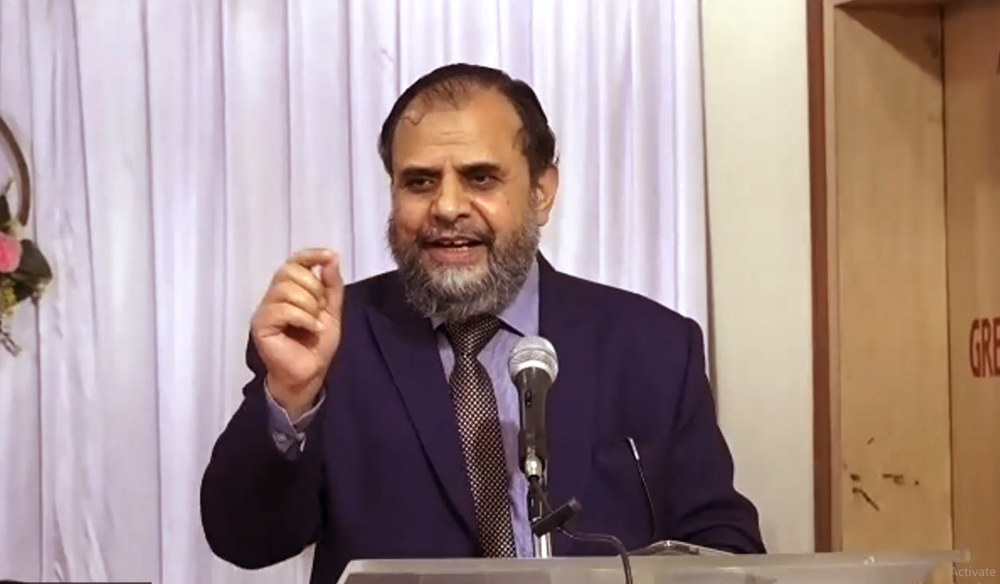
In his presidential remarks, Vice-chairman, IOS, Prof. M. Afzal Wani, observed that people wanted mutual understanding, dialogue, and peace. Despite the efforts of Buddha, Jesus, Krishna, and the Prophet (PBUH), people were still at war. He said that educational institutions would have to come forward to let the students learn love and harmony. The institution of justice was fraught with contradictions, and there was a need to examine what humanity required. He asked for bringing humanity to the human pedestal. He also focused on the similarity of several things in both Islam and Hinduism. Every religion had the message that each individual was human, and the academics were required to do research and transfer their knowledge to the younger generation. He remarked that if menfolk went astray, womenfolk would rise to tell the former that they were wrong. Referring to the two World Wars, he said that while about 6 million people died in the First World War, nearly 60 million people were killed in the Second World War. He observed that every religion had several positive as well as negative aspects. Exhorting the students to become multi-disciplinary and vibrant, he held that the responsibility of the prophets had devolved on scholars and academics.
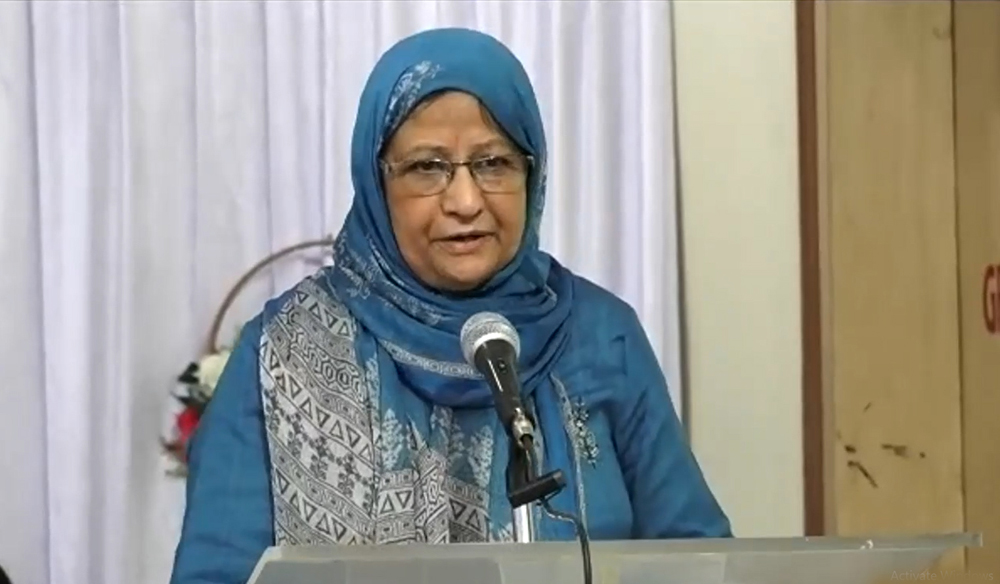
The inaugural session concluded with a vote of thanks extended by Prof. Haseena Hashia, Assistant Secretary General, IOS.
Business session I
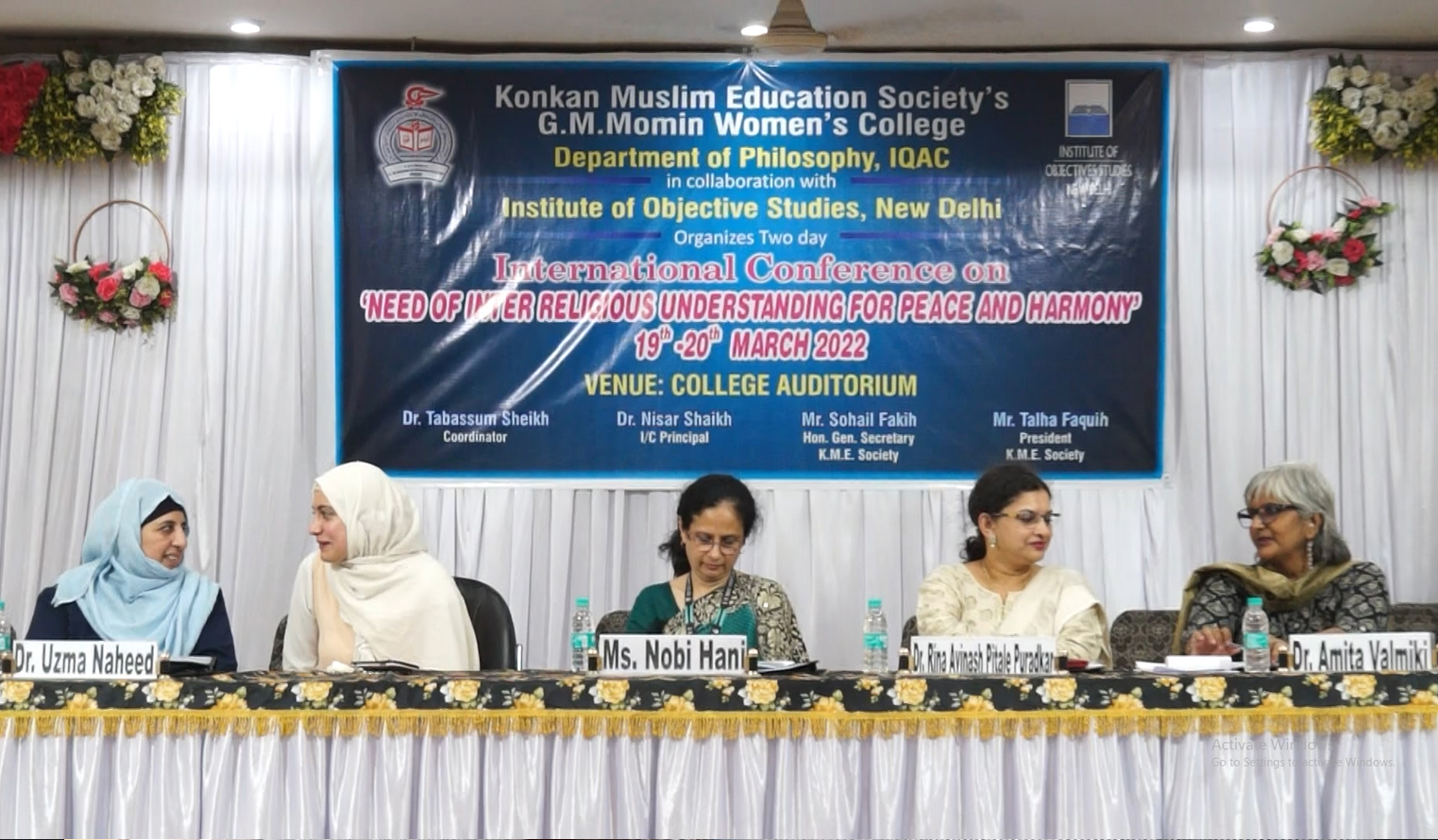
The first business session focused on Indic religions and peace. While Dr. Amita Valmiki from Mumbai chaired the session, Prof. Srinivasan Iyer from Madurai was the co-chairperson. Prof. Abdur Rashid Bhat from Kashmir was the moderator.
Ms. Simmin Bawa, Head, Department of Philosophy, Jai Hind College, Mumbai, was the first speaker who spoke on ‘The Pathway to Peace and Harmony: A Buddhist Perspective’. She said that according to Buddhism, violence begot violence. Thus Buddhism stood for the principle of non-violence and the culture of peace and harmony. She observed that there were internal causes of conflict and violence.
Prof. Fahim Akhtar Nadwi, Head, Department of Islamic Studies, MANUU, Hyderabad, centred his talk on the ‘Concept of Peace in Islam’. He held that misquoting Islam created many problems. Islam was the religion of peace in relation to the rest of the religions. It was also the religion of preaching and never allowed forced conversions. Islam recognized all religions, which meant the co-existence of every religion. Unlike other religions, Islam never asked for performing rituals. He said that the Quran and Hadith laid stress on doing good deeds.
Dr. Uzma Naheed, Member, United Nations’ GDF (Global Dialogue Foundation), Mumbai, observed that politicians exploited religion. Islam believed in one human being. She urged all heads of religions to come together for harmony and peace.
Iymen Nazir, Research Scholar, Department of Religious Studies, Central University of Kashmir, spoke on ‘Interfaith Dialogue among Indian Religions.’ Explaining inter-faith dialogue, he said that it was a way of communication among people belonging to different religions. They must treat each other as part of a cosmic society, he added. Dr. Amena Hamid from Kashmir focused on Islam and peace. She explained religious harmony from the Islamic point of view.
Dr. Daljit Kaur, Associate Professor, Mata Sundri College for Women, University of Delhi, spoke on ‘Sikh Gurdwaras: Epitome of Peace and Harmony’. She said that Kartarpur Sahib Gurudwara was the workplace of Sikhism. It was the legacy of Sikhism in the 21st century, she noted. Asra Aslam and K Sajad Ahmad, Research Scholars, Department of Islamic Studies, BGSB University, Rajouri, J&K, presented a joint paper on ‘Islam and Peaceful Co-Existence: An Appraisal of Mithaq-i-Medina’. In their presentation, they contended that Islam was the religion of peace and harmony. Mithaq-i-Madina or the Constitution of Madina was the first constitution of the world. It was an agreement between Muslims and Jews of Madina where the population of both the communities stood at 40 and 15 per cent, respectively. They shed light on the Islamic perspective of peace. At the end of the session, Prof. Srinivasan Iyer called for working towards peace and harmony.
Business Session II
.jpg)
The theme of the session was Semitic Religion and Peaceful Living. The session was chaired by Dr. Nazir Ahmad Zargar from Kashmir. Dr. Radha Kumar from Mumbai was the moderator.
Dr. Nazar Ul Islam, Assistant Professor, Department of Islamic Studies, GDC, J&K, was the first speaker of the session who touched upon ‘Peace and Conflict Resolution in Islam: A perspective building’. He was followed by Dr. Javed Nadeem Nadvi, Assistant Professor, Department of Arabic, MANUU, Hyderabad. He observed that Islam spread the message of peace and harmony to promote righteousness. The third speaker was Dr. Kamal Ashraf Qasmi, Assistant Professor, Dept. of Islamic Studies, Aliah University, Kolkata, who focused on ‘Baahmi Mazhabi Afham-o-Tafheem ki Zaroorat: Daur-e-Hazir ki Ashad Zaroorat’. Sumna Sadaqat, post-graduate, final year student, Department of Islamic Studies, Jamia Millia Islamia, Delhi, was the next speaker who spoke on ‘Concept of Peace in Islam.’ She was followed by Mahvish Fatima, Research Scholar, Department of Islamic Studies, JMI, Delhi who focused on ‘Prophetic Model of maintaining Peace and Harmony’. She stressed ensuring the security of life and avoiding conflict. While Afreen Showqat, Department of Religious Studies, Central University of Kashmir, J&K, who spoke on ‘Islam and Peaceful Behaviour,’ insisted that Islam was a monotheistic religion, Horiya Hussain, Research Scholar, Shah-i-Hamadan Institute of Islamic Studies, University of Kashmir, J&K, focused on ‘Interfaith Dialogue and Islamophobia: Challenges And Prospects’ and held that one must strictly follow their faith. While Dr. Kounsar Jabeen, Research Scholar, University of Kashmir, J&K, talked about the ‘Role of Islam towards Peace and Progressive Behaviour’, Niyaz Ahmad Lone, PhD Scholar, Islamic University of Science and Technology, J&K discussed ‘Islam and Peaceful Behaviour’. Juneefa Bilal, Research Scholar, Department of Islamic Studies, University of Kashmir, Srinagar, was the last speaker who focused on the ‘Qur’anic Paradigm of Religious Harmony’.
Business Session III
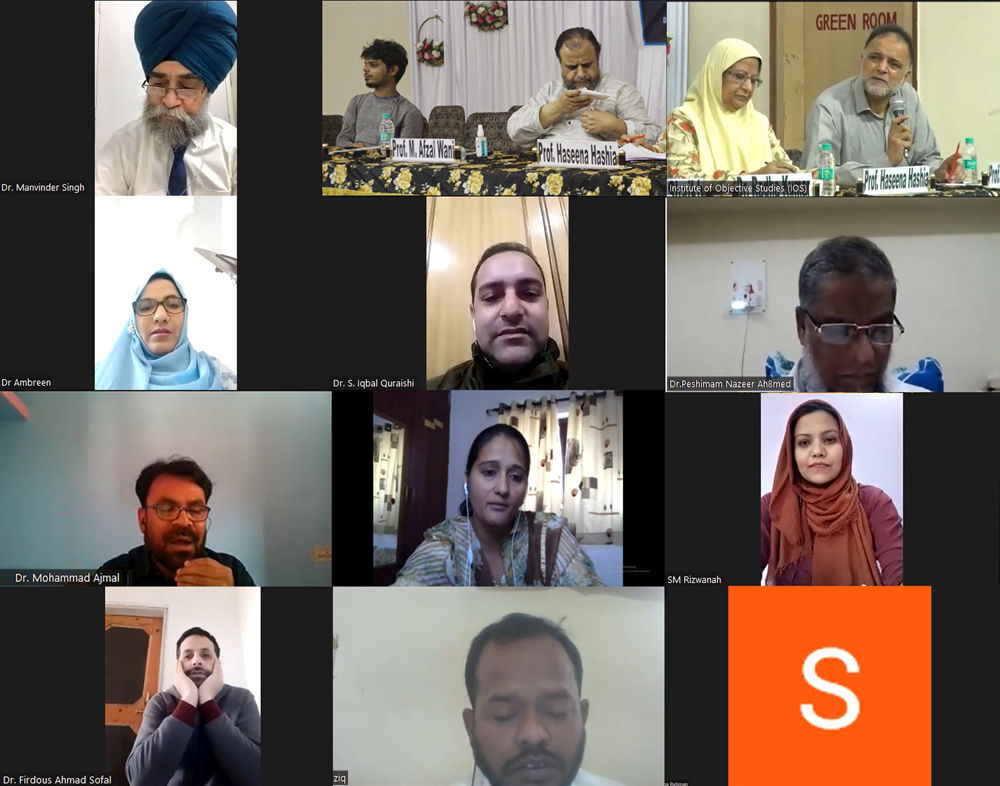
The third business session was devoted to the theme ‘Personalities and Movements for Peace Promotion’. While Dr. Manvinder Singh from Amritsar chaired the session, Dr. Shahnaz Iqbal Qureshi moderated it.
Dr. Radha Kumar, Associate Professor, Department of Ancient Indian History, Culture and Archaeology, St Xavier's College, Mumbai, spoke on ‘The tales of Jatakas- An inspiration for harmonious living’. She referred to Ajanta caves and their paintings which were commissioned by the Nizam of Hyderabad to be re-produced. Re-production of paintings caused dissatisfaction among a section of the people. The Suttas were the sources of Buddhist teachings. The Jataka stories were inclusive and indicative of the life to be led with discipline. Dr. Peshimam Nazeer Ahmed, Educational Consultant, Head Master (Retd.), Osmani Higher Second School, Tirupattur, Tamil Nadu, devoted his paper to ‘Al-Biruni and his understanding of Indian Religion’. He said that Al-Biruni was a universal genius and most original in his writings. He was the religious historian of his time. Dr. Mohammad Ajmal, Assistant Professor, Jawaharlal Nehru University, New Delhi, focused on ‘Contribution of Maulana Abul Kalam Azad to India’s Unity in Diversity’. He said that Maulana Abul Kalam Azad believed in unity, diversity, and Hindu-Muslim unity. He was followed by Dr. Arshi Shoaib, Assistant Professor, Women’s College, AMU, Aligarh, who spoke on ‘Dissemination of Peace and Harmony: A Study of Maulana Wahiduddin Khan’s Endeavours’. He said that Maulana Wahiduddin Khan was called the ambassador of peace due to his endeavors in this direction. He was the founder of the Centre for Peace and Spirituality, Dr. Shoaib added. While S.M. Rizwanah, PhD Scholar, Department of Philosophy, Manipur University, touched upon the theme ‘Swami Vivekananda’s Concept of Universal Religion’. Dr. Ambreen, Research Scholar, Department of Islamic Studies, AMU, Aligarh, made her presentation on ‘The Emphasis on Peace and Harmony in the Quran as reflected in the Tafsir of Maulana Azad’.
Dr. Firdous Ahmad Sofal, Assistant Professor, School of Education, Central University of Kashmir, J&K, focused on ‘Non-violence and Education: Reflections from Basic Scheme of Education advocated by M.K. Gandhi’. In his concluding remarks, Dr. Manvinder Singh said that all the religions preached peace and harmony. Every religion contributed something or the other for the benefit of society. While Mughals gave Urdu, Ghalib, and Taj Mahal, Christians did tremendous service in the field of education, and Sikhs established community kitchens. He emphasised the need for diversity and dialogue.
Business Session IV
.jpg)
The fourth business session focused on ‘Religious Understanding for Preserving Peaceful and Harmonious Society.’ While G.N. Taqi chaired the session, Dr. Shivani Sharma from Chandigarh was the co-chairperson, and Ms. Simmin Bawa moderated the session.
Dr. Amar Singh, Assistant Professor, Department of Philosophy, University of Mumbai, spoke on ‘What is the role and impact of religion in Social harmony?’ He was followed by Dr. Zabeen Anjum, Former Principal, Jamia Urdu College of Education, Aligarh, who touched on ‘Prophet’s Peace Mission: An Analysis’. While Ms. Ujala Amin, PhD Scholar, Department of Islamic Studies, BGSB, University, Rajouri, focused on ‘The message of peace and communal harmony in the teaching of Sufis,’ Poojita Goswami, Scholar, Centre for Peace and Conflict Studies, Tata Institute of Social Sciences, Guwahati, Assam, spoke on ‘Peace, Youth and Interfaith Leadership: Value-based peace-building by advancing religious peace ideals’. Mumim Ahmad Khan, Research Scholar, Department of Islamic Studies, AMU, Aligarh, devoted his presentation to ‘Ottoman Inter-Religious Understanding for Promoting Peace and Harmony with Special Reference to Millet System’. Muneeb Ahmad, Research Scholar, Department of Islamic Studies, IUST, J&K, focused on ‘An Islamic-cum-Hindu Approach to Inter-religious Dialogue’. He said that the dialogue was as old as the history of humankind itself. Oroos Nasim, Research Scholar, AMU, made presentation on ‘Sufism and Peaceful Dialogue.’ While Saba Irshad Ansari, PhD Scholar, Department of Islamic Studies, AMU, spoke on ‘Ahimsa and Jihād-i-Maʿnawī: Drawing Parallels Between The Two Imperatives’, Shakeel Ahmad Lone, Research Scholar, Department of Islamic Studies, AMU, Aligarh, touched upon the topic ‘An Islamic Perspective of Peace and Communal Harmony’. He observed that peace could not exist without communal harmony.
The next paper presenter was Sohail Ashraf Mir, Research Scholar, Department of Islamic Studies, AMU, Aligarh, who focused on ‘Fatehullah Gulen: His perspectives on Interreligious Dialogue’. He said that religion was the most important aspect of humans, and all the faiths had the same narrative. The last speaker of the session was Dr. Mukesh Pimplaskar, Dept. of Bio-Technology. G. M. Momin Women’s College, who briefly discussed Panchsheel (five principles), which were vital for global peace.
Business Session V
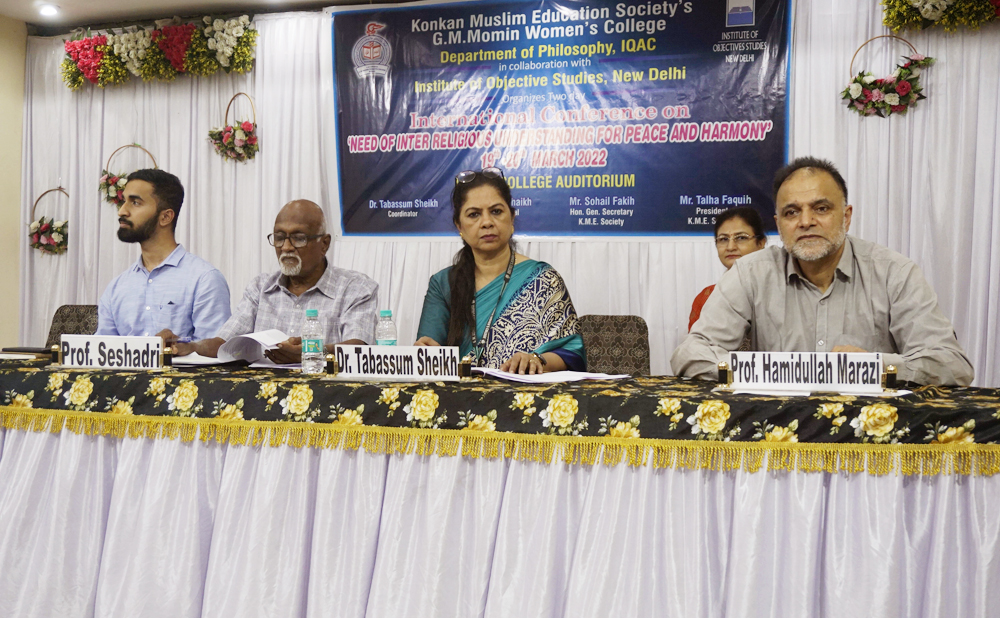
The fifth session was devoted to the theme. ‘Role of Education for Promoting Peace and Dialogue’. While Prof. Seshadri chaired the session, Dr. Afroz Ahmad assisted him as co-chairperson. Dr. Jeremiah Graham was the moderator.
Dr. Sheikh Idris Ahmad, Head, Department of Islamic Studies, Government Degree College, J&K, was the first speaker of the session. He focused on ‘An Islamic Approach of the Interreligious Dialogue with reference to Inclusivism and Exclusivism’. He was followed by Dr. Ziauddin, Assistant Professor, Department of Islamic Studies, AMU, Aligarh. He spoke about the need to respect other religions. In his presentation, he commented on Sir Syed’s response to other religions.
Business Session VI
.jpg)
The sixth business session was devoted to mmiscellaneous themes. It was chaired by Prof. D. A. Gangadhar from Varanasi. Prof. Manzoor Ahmad co-chaired the session. Prof. Hamidullah Marazi was the moderator.
Dr. Omkar Bhatkar, Head, St. Andrew’s Centre for Philosophy and Performing Arts (SAPP), St. Andrew’s College, St. Dominic Road, Mumbai, focused on ‘Saints, Statues, Scriptures and Syncretism of Everyday Life: A Leaf from Goa’s Organic Civility’. He said that the past five centuries shaped Goa’s culture, life, and customs. He also referred to Goa’s pluralism. He was followed by Prof. Syed Jamaluddin, Director, IOS Centre for Historical and Civilisational Studies, Delhi, who spoke on ‘Lost In Bewilderment whither Should Man Go: Here Comes the Role of Masjid And Imams in Character Building and Maintaining Peace and Harmony. He stressed that an Imam should possess knowledge of the Qur’an. He must be a man of character and integrity. He said that Imam and masjid occupied a central place in Islam. One should remember that the masjid was also a social platform. It was also a central place to raise funds. An Imam should a role model for Muslims. Management of masjids should confine itself to fundraising. An Imam should be an Islamic scholar. Imams could play other roles than only conducting prayers. He contended that shoora should be constituted to conduct the affairs of a masjid. Speeches before the Friday Khutbah should focus on current affairs. Masjids could also play an important role in the character building and personality development of Muslim youth. Imams are also urged to speak of secular values, he added.
The third speaker of the session was Dr. Amita Valmiki, Head, Department of Philosophy, R. J. College of Arts, Science and Commerce. She expressed her views on ‘Re-envisioning the Notion of Religious Pluralism and its Exigency in Contemporary Times’. She said that social and corporeal distancing during the Covid-19 pandemic had a bearing on human relations, adding that the diversity inherent in India’s ethos should be celebrated. Dr. Nadeem Ashraf, Assistant Professor, Department of Sunni Theology, AMU, Aligarh, touched upon ‘The Rights of Non-Muslims in a Plural Society’. He said that the non-Muslims living in Muslim countries should receive equal treatment, and there should be no distinction between Muslims and non-Muslims. While Z.A. Naik, Research Scholar, Department of Islamic Studies, BGSB University Rajouri, J&K, focused on ‘Revisiting the Concept of Mu’alafatul Qulub in Zakat Distribution: A Move towards Religious Harmony’. Firdosa Akhter, Senior Research Fellow, Department of Islamic Studies, AMU, Aligarh, presented the paper on ‘Philosophy of Human Dignity: An Islamic Perspective’. Gawhar Ahmad Khan, Research Scholar, Department of Islamic Studies, Islamic University of Science and Technology, Awantipora, J&K, was the last speaker who dwelt on ‘Peace as the basis of Prosperity with special reference to Sirah of Prophet Muḥammad (SAW)’.
Valedictory Session
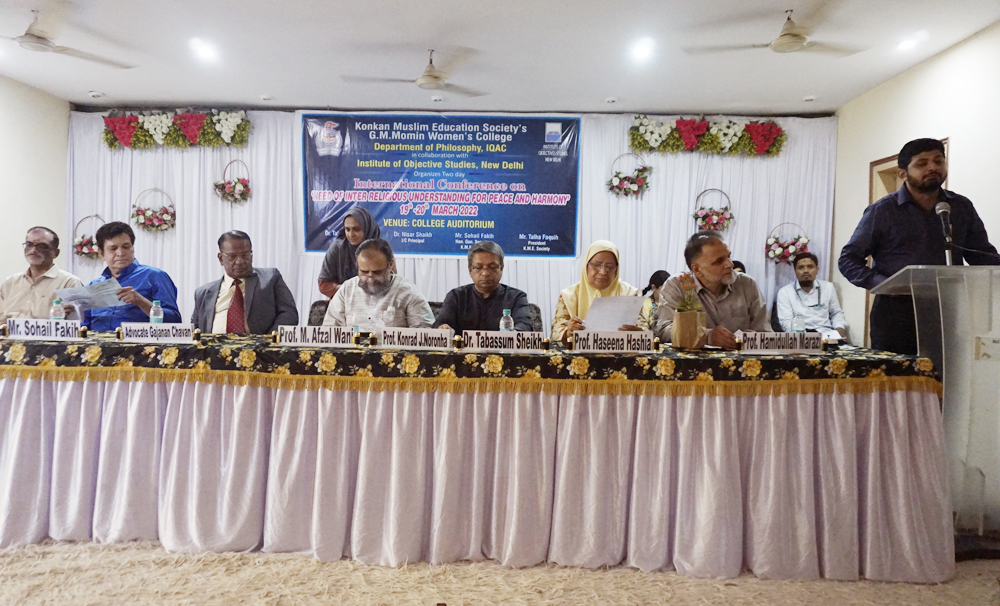
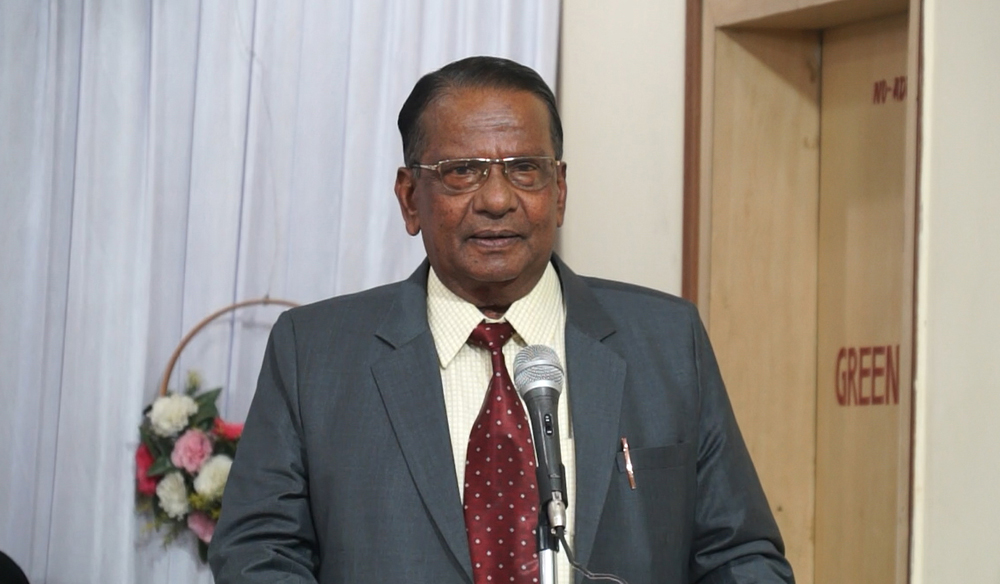
Speaking as the guest of honour, Advocate Gajanan Chavan, Ex-Chairperson, Bar Council of Maharashtra and Goa, advised everybody to read the Indian Constitution and know about the fundamental rights of a citizen guaranteed by it. There were definitely certain issues pertaining to diversity, which could be addressed by mutual understanding. Tolerance was another aspect of a host of problems that defied solutions. Tolerance had been a part of the country’s cultural legacy. Referring to Russia’s war with Ukraine, he said that nearly 30 per cent of the Ukrainian population suffered due to it. He sought to know the reason why Russia, a developed country, went to war. Lauding the role of Mahatma Phule and his wife in the spread of education in Maharashtra, he said they were pioneers of education. The role of Fatima Sheikh and Savitri Bai Phule in that direction was unparalleled. He remarked that there was a big disparity between India and Bharat. He painted a dim picture of facilities like toilets, employment, sanitation, etc. He concluded by saying that everyone should get education and at least one member of each family should be employed as a teacher.
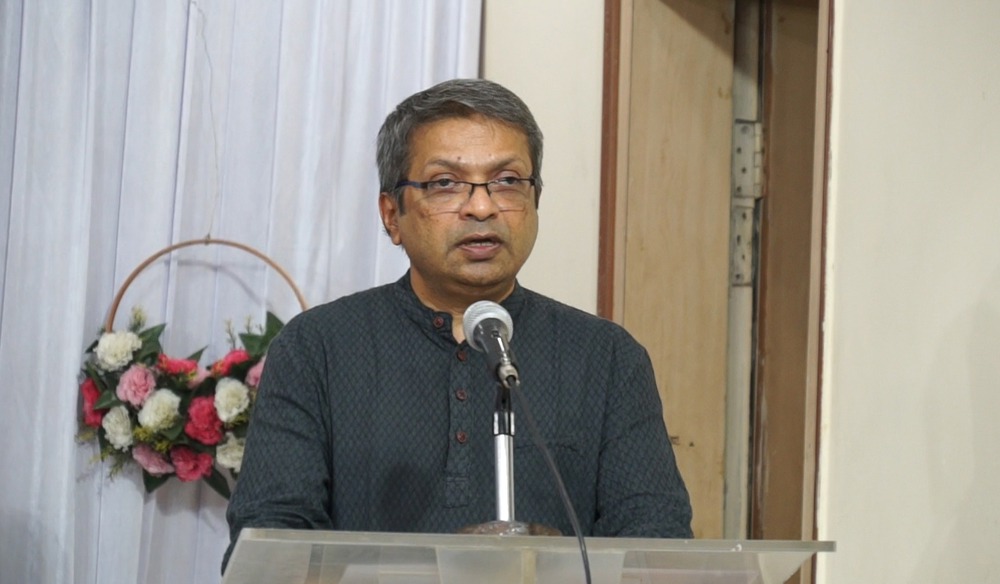
Prof. Konrad J. Noronha, Director, Center for Safeguarding and Human Formation, De Nobili College, Pune, in his address as the guest of honour, stressed the need to strengthen inter-religious understanding among various faiths and communities.
Delivering the valedictory address, Prof. Abdul Aziz Barghout, Dean, ISTAC, Malaysia, laid emphasis on inter-religious dialogue, peace, and harmonious relations with the followers of other religions. He said that humanity had no future without co-existence. Therefore, cooperation, respect, and collaboration needed to be strengthened for a better understanding of religions. There should be a common ground for working together in the areas of the protection of the earth, environment, global warming, and biodiversity. Working together would be a big mission for the sake of humanity. He also expressed grave concern over Islamophobia and the belittling of Islam. He observed that spirituality, ethics, and values could not be bought from the market. These could be derived from the understanding of religions that taught harmony and peace for a better future. Human survival depended on ethics, spirituality, mercy, caring, artificial intelligence, sustainability, etc. Both Muslims and non-Muslims needed to work together, he added.
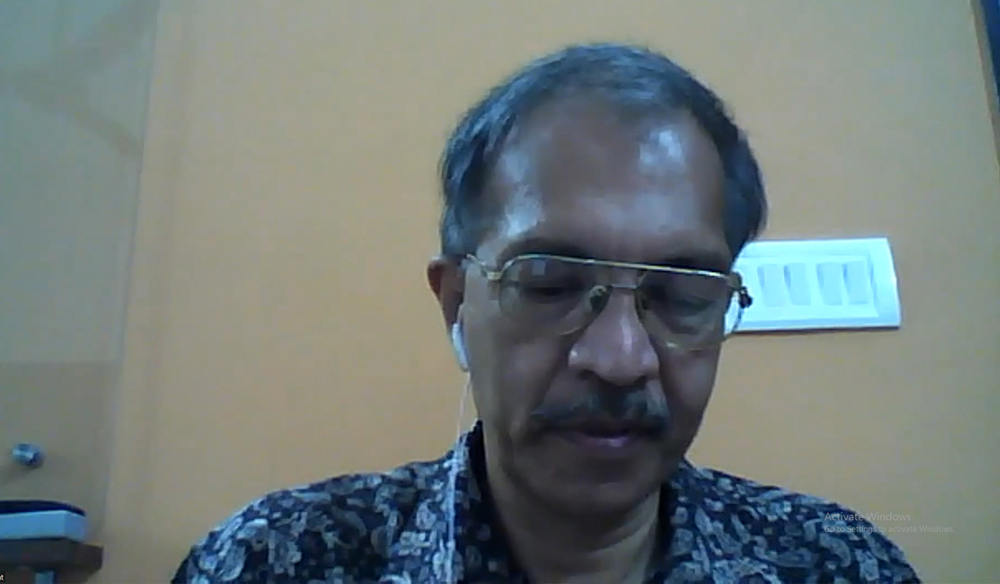
Making special remarks, General Secretary, Temple of Understanding India Foundation, New Delhi, Dr. A.K. Merchant, said that religion had come a long way, particularly in promoting inter-religious harmony and understanding. In today’s world of globalisation, interdependence for achieving development goals is inescapable. Water was one such goal that required the cooperation of all. He called for the evolution of inter-religious understanding for the promotion of unity and spirituality. He observed that science had displaced the value of religion. Thus there was a need to harness the energy of religion on one hand and science on the other. Learning to know, to do, and to live together were the pillars on which life rested, he concluded.
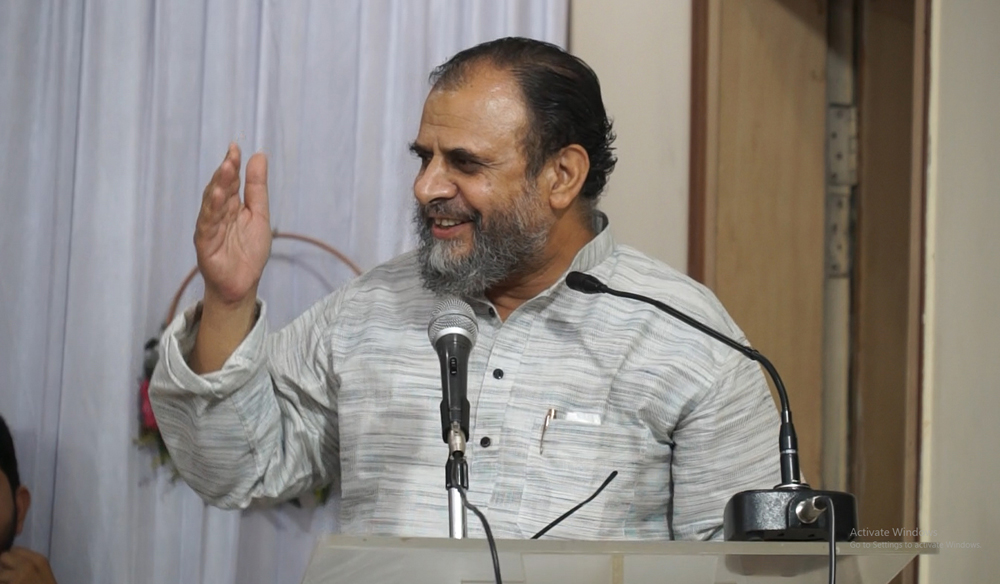
In his presidential remarks, Prof. M. Afzal Wani commented that religions brought eligibility for a better relationship. He briefly elaborated on the concept of liberty, fraternity, and justice. He said that ethical and moral power was supreme to nuclear and economic power. He asked the scholars to cherish humanity and social relationship.
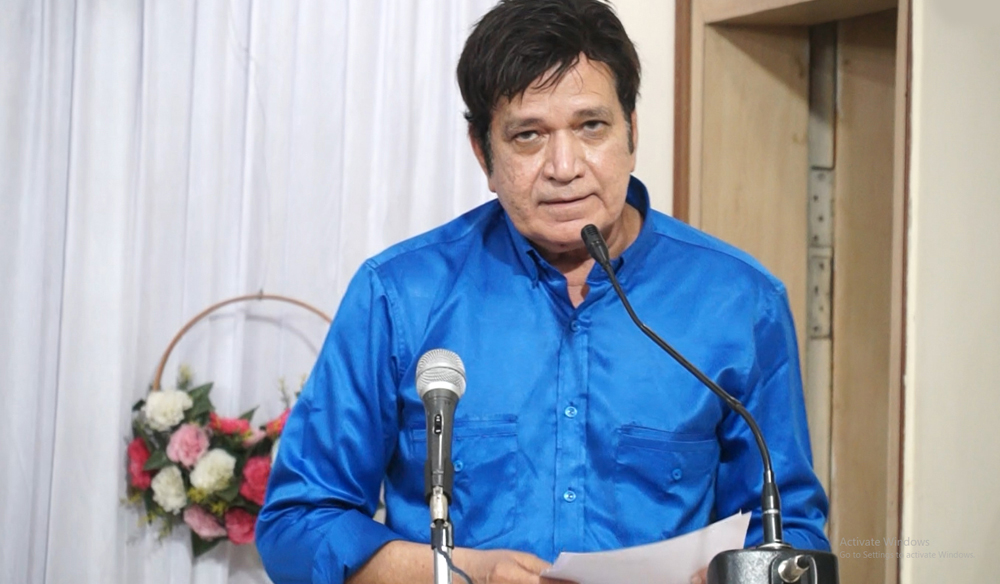
The secretary general, Konkan Muslim Education Society, Bhiwandi, Sohail Fakih, also expressed his views on the contribution of society in the promotion of education among Muslim women.
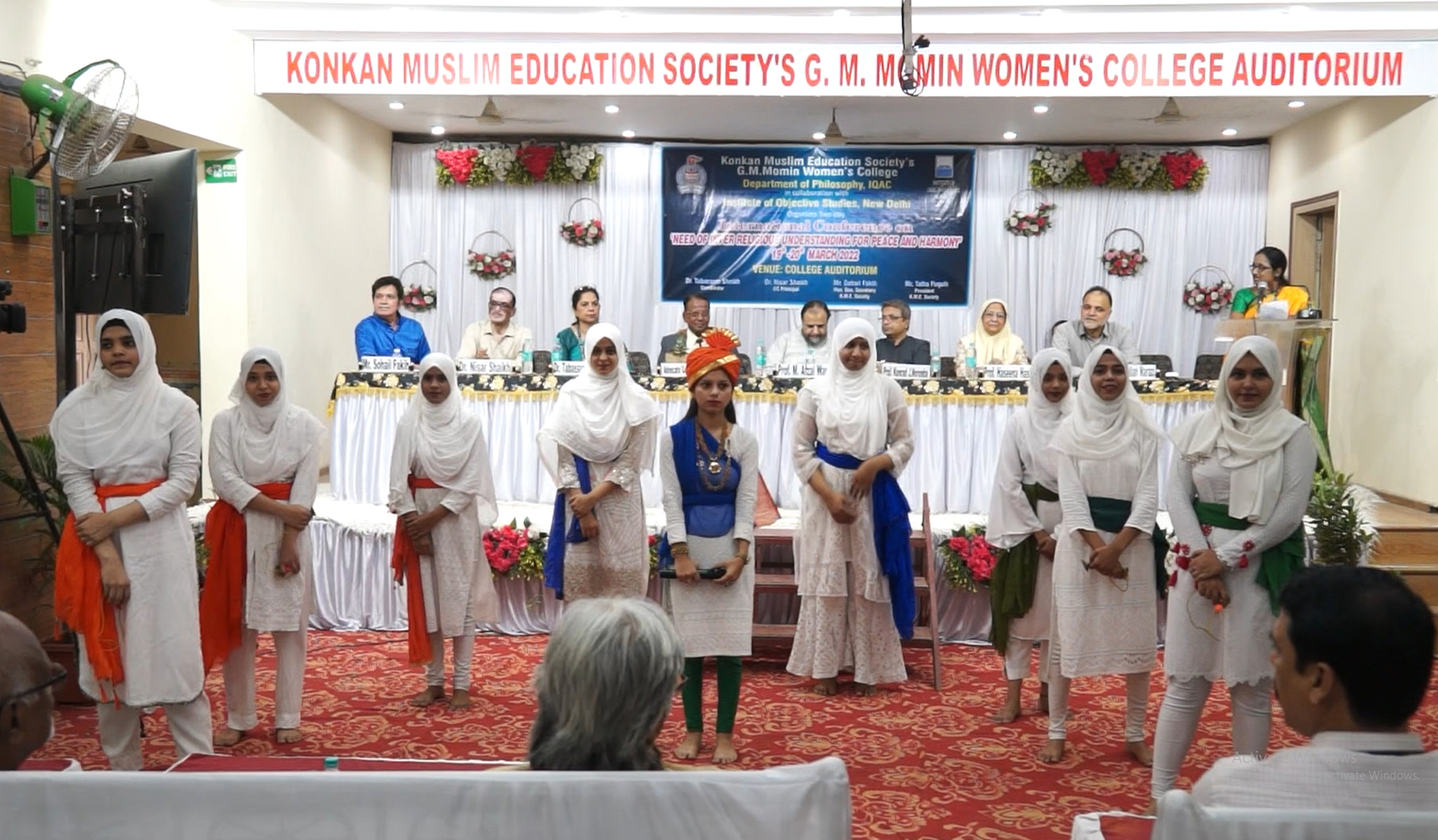
The occasion was marked by the presentation of Maharashtrian folk songs by the students of the college.
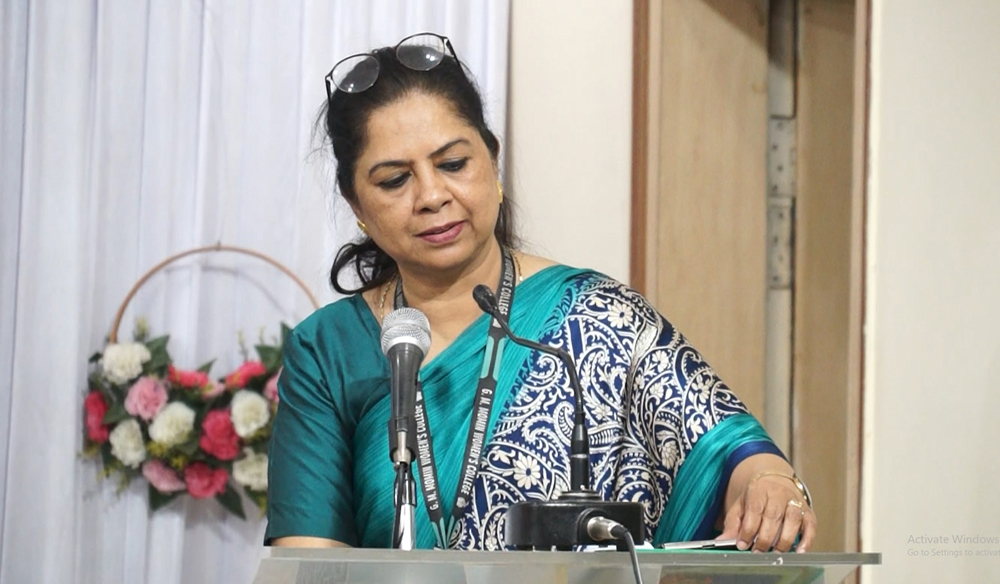
Co-ordinator of the conference Dr. Tabassum Sheikh, extended a vote of thanks to the participants.
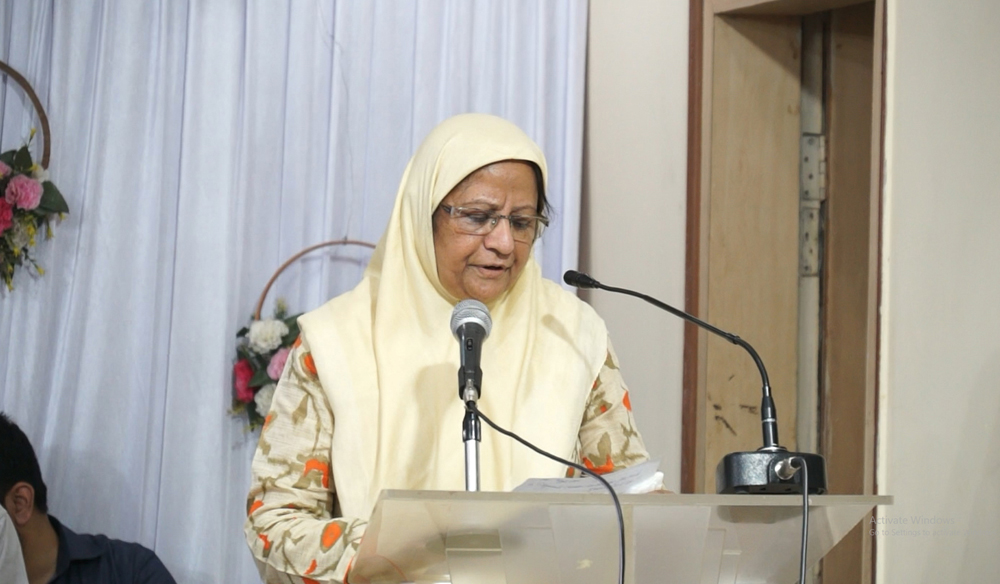
A six-point resolution unanimously adopted by the participants was read out by Prof. Haseena Hashia, Assistant Secretary General, Institute of Objective Studies. The resolution read as:
- The international bodies/institutions and national governments are urged to take a serious view of the ground situation, create mutual trust, and take necessary measures to promote peace and harmony in the world.
- Efforts should be made to dispel doubts among the religious communities about one another, which are prominently spoiling the environment of peace and harmony in different parts of the world.
- The academic bodies and voluntary organisations at international, national, and local levels should carry out educational initiatives to develop a fair understanding of religions for attaining their real objectives of establishing a peaceful world.
- There should be regular programmes on inter-religious understanding at various places in India and Maharashtra organized jointly by the Institute of Objective Studies, M. Momin women’s College, Bhiwandi, and other interested organisations.
- The relevant authorities should strive to include a special course in their educational curricula to teach common core values of harmony, peace, and dialogue among Indian religions.
- At the local level, G. M. Momin College, Bhiwandi, R. J. College of Arts & Commerce, Mumbai, St. Xavier’s College, Mumbai, and Jai Hind College, Mumbai, should form a core group to carry on regular programmes on inter-religious dialogue in collaboration with the Institute of Objective Studies. Religious scholars and community leaders of all the communities should be invited to these programmes.
Go Back